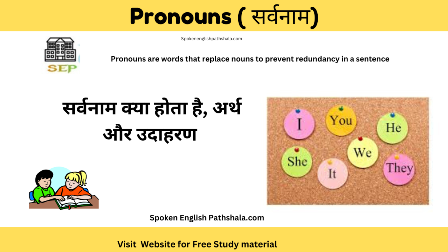Pronouns are the unsung heroes of language, offering efficiency and clarity to our communication. They are versatile words that substitute for nouns, helping us avoid repetition and streamline our sentences. In this comprehensive guide, we’ll delve into the world of pronouns, exploring their various types, functions, and the role they play in the English language. We’ll provide examples in both English and Hindi to illustrate their usage and offer a comprehensive understanding.
सर्वनाम वह शब्द होते हैं जिनका उपयोग किसी व्यक्ति, वस्तु, स्थान, या विचार के नाम की जगह पर किया जाता है। सर्वनाम वाक्य में नाम की पुनरावृत्ति से बचाते हैं और वाक्य को संक्षिप्त और स्पष्ट बनाते हैं।
Pronoun Definition (सर्वनाम की परिभाषा):
Pronouns are words that replace nouns to prevent redundancy in a sentence. They serve as convenient stand-ins for people, places, things, or ideas. Pronouns simplify our language and enhance its fluidity.
Types of Pronouns (सर्वनाम के प्रकार):
1. Personal Pronouns (व्यक्तिवाचक सर्वनाम):
Personal pronouns refer to specific people or things and change based on their role in a sentence. They include words like “he,” “she,” “it,” “they,” and “I.”
Example (उदाहरण):
English: “She is going to the market.”
Hindi: “वह बाजार जा रही है।”
2. Possessive Pronouns (परसर्गवाचक सर्वनाम):
Possessive pronouns indicate ownership or possession without the need for an apostrophe. They include words like “mine,” “yours,” “his,” “hers,” and “theirs.”
Example (उदाहरण):
English: “Is this pen yours?”
Hindi: “क्या यह कलम तुम्हारी है?”
3.Demonstrative Pronouns (संप्रेषण सर्वनाम):
Demonstrative pronouns are used to indicate specific items in relation to the speaker. They include words like “this,” “these,” “that,” and “those.”
Example (उदाहरण):
English: “I prefer this shirt.”
Hindi: “मुझे यह शर्ट पसंद है।”
4. Relative Pronouns (सांबंधिक सर्वनाम):
Relative pronouns introduce relative clauses and connect them to the main clause. They include words like “who,” “which,” “that,” and “whose.”
Example (उदाहरण):
English: “The car that he bought is red.”
Hindi: “वह कार जो उन्होंने खरीदी है, लाल है।”
5. Interrogative Pronouns (प्रश्न सर्वनाम):
Interrogative pronouns are used to form questions. They include words like “who,” “what,” “which,” “whose,” and “whom.”
Example (उदाहरण):
English: “Who is at the door?”
Hindi: “कौन दरवाज़े पर है?”

The Significance of Pronouns in Sentences
Pronouns serve several vital functions in sentences:
- Avoiding Repetition: Pronouns replace nouns to prevent repetitive use of the same words in a sentence, making it more concise.Example (उदाहरण):
- English: “John loves his car because he takes good care of it.”
- Hindi: “जॉन अपनी कार से प्यार करता है क्योंकि वह अच्छी तरह से इसकी देखभाल करता है।”
- Indicating Ownership: Possessive pronouns are used to signify possession, eliminating the need for an apostrophe.
- Example (उदाहरण):
- English: “The house is yours.”
- Hindi: “घर तुम्हारा है।”
- Providing Clarity: Demonstrative pronouns clarify which specific item or items are being referred to.
- Example (उदाहरण):
- English: “Please pass me those scissors.”
- Hindi: “कृपया उन कैंचियाँ मुझे पास करें।”
- Introducing Relative Clauses: Relative pronouns connect relative clauses to the main clause, offering additional information.
- Example (उदाहरण):
- English: “The book which I borrowed is fascinating.”
- Hindi: “वह किताब जिसे मैंने उधार ली है, बेहद दिलचस्प है।”
- Forming Questions: Interrogative pronouns are used to construct questions, guiding the inquiry.
- Example (उदाहरण):
- English: “What are you doing?”
- Hindi: “तुम क्या कर रहे हो?”
Pronouns are linguistic workhorses that streamline our sentences and enhance the clarity and efficiency of our communication. By grasping the concept of pronouns and their various types and functions, we empower ourselves to articulate thoughts and ideas effectively, whether in English, Hindi, or any other language. Pronouns enable us to convey meaning with conciseness and precision, making them an indispensable aspect of language.
यदि आपको इस लेख (The Pronouns) पसंद आया हो, तो कृपया इसे अपने दोस्तों के साथ सोशल मीडिया पर साझा करें, जैसे कि WhatsApp, Facebook, आदि। धन्यवाद! – spoken english pathshala.com
If you found this article (The Pronouns) enjoyable, please do share it with your friends on social media platforms such as WhatsApp, Facebook, and others. Thank you! – spokenenglishpathshala.com
Table of Contents
Also visit our youtube channel- @spokenenglishpathshala
